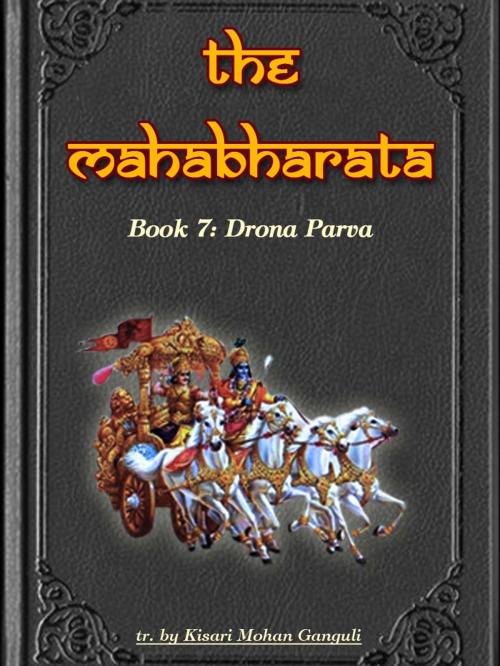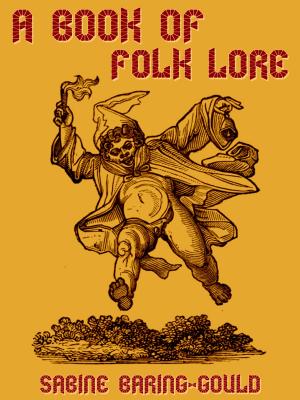The Mahabharata, Book 7: Drona Parva
Nonfiction, Religion & Spirituality, Eastern Religions, Hinduism, Inspiration & Meditation, Spirituality, History| Author: | Kisari Mohan Ganguli | ISBN: | 1230000036148 |
| Publisher: | AppsPublisher | Publication: | December 3, 2012 |
| Imprint: | Language: | English |
| Author: | Kisari Mohan Ganguli |
| ISBN: | 1230000036148 |
| Publisher: | AppsPublisher |
| Publication: | December 3, 2012 |
| Imprint: | |
| Language: | English |
The Mahabharata, Book 7: Drona Parva
Kisari Mohan Ganguli, tr.
Om! Having bowed down to Narayana, and Nara the foremost of male beings, and the goddess Saraswati also, must the word Jaya be uttered.
It is of immense importance to the culture of the Indian subcontinent, and is a major text of Hinduism. Its discussion of human goals (artha or purpose, kama or pleasure, dharma or duty/harmony, and moksha or liberation) takes place in a long-standing tradition, attempting to explain the relationship of the individual to society and the world (the nature of the 'Self') and the workings of karma.
The object of a translator should ever be to hold the mirror upto his author. That being so, his chief duty is to represent so far as practicable the manner in which his author's ideas have been expressed, retaining if possible at the sacrifice of idiom and taste all the peculiarities of his author's imagery and of language as well. In regard to translations from the Sanskrit, nothing is easier than to dish up Hindu ideas, so as to make them agreeable to English taste. But the endeavour of the present translator has been to give in the following pages as literal a rendering as possible of the great work of Vyasa. To the purely English reader there is much in the following pages that will strike as ridiculous. Those unacquainted with any language but their own are generally very exclusive in matters of taste. Having no knowledge of models other than what they meet with in their own tongue, the standard they have formed of purity and taste in composition must necessarily be a narrow one. The translator, however, would ill-discharge his duty, if for the sake of avoiding ridicule, he sacrificed fidelity to the original. He must represent his author as he is, not as he should be to please the narrow taste of those entirely unacquainted with him. Mr. Pickford, in the preface to his English translation of the Mahavira Charita, ably defends a close adherence to the original even at the sacrifice of idiom and taste against the claims of what has been called 'Free Translation,' which means dressing the author in an outlandish garb to please those to whom he is introduced.
"Janamejaya said, 'Hearing that his sire Devavrata of unrivalled vigour and sturdiness, and might, energy and prowess, had been slain by Sikhandin, the prince of the Panchalas, what, indeed, O regenerate Rishi, did the powerful king Dhritarashtra with eyes bathed in tears do? O illustrious one, his son (Duryodhana) wished for sovereignty after vanquishing those mighty bowmen, viz., the sons of Panda, through Bhishma and Drona and other great car-warriors. Tell me, O thou that hast wealth of asceticism, all that he, of Kura's race, did after that chief of all bowmen had been slain.'
"Vaisampayana said, 'Hearing that his sire had been slain, king Dhritarashtra of Kura's race filled with anxiety and grief, obtained no peace of mind. And while he, of Kura's race, was thus continually brooding over that sorrow, Gavalgana's son of pure soul once more came to him. Then, O monarch, Dhritarashtra, the son of Amvika, addressed Sanjaya, who had that night come back from the camp to the city called after the elephant. With a heart rendered exceedingly cheerless in consequence of his having heard of Bhishma's fall, and desirous of the victory of his sons, he indulged in these lamentations in great distress.'
The Mahabharata, Book 7: Drona Parva
Kisari Mohan Ganguli, tr.
Om! Having bowed down to Narayana, and Nara the foremost of male beings, and the goddess Saraswati also, must the word Jaya be uttered.
It is of immense importance to the culture of the Indian subcontinent, and is a major text of Hinduism. Its discussion of human goals (artha or purpose, kama or pleasure, dharma or duty/harmony, and moksha or liberation) takes place in a long-standing tradition, attempting to explain the relationship of the individual to society and the world (the nature of the 'Self') and the workings of karma.
The object of a translator should ever be to hold the mirror upto his author. That being so, his chief duty is to represent so far as practicable the manner in which his author's ideas have been expressed, retaining if possible at the sacrifice of idiom and taste all the peculiarities of his author's imagery and of language as well. In regard to translations from the Sanskrit, nothing is easier than to dish up Hindu ideas, so as to make them agreeable to English taste. But the endeavour of the present translator has been to give in the following pages as literal a rendering as possible of the great work of Vyasa. To the purely English reader there is much in the following pages that will strike as ridiculous. Those unacquainted with any language but their own are generally very exclusive in matters of taste. Having no knowledge of models other than what they meet with in their own tongue, the standard they have formed of purity and taste in composition must necessarily be a narrow one. The translator, however, would ill-discharge his duty, if for the sake of avoiding ridicule, he sacrificed fidelity to the original. He must represent his author as he is, not as he should be to please the narrow taste of those entirely unacquainted with him. Mr. Pickford, in the preface to his English translation of the Mahavira Charita, ably defends a close adherence to the original even at the sacrifice of idiom and taste against the claims of what has been called 'Free Translation,' which means dressing the author in an outlandish garb to please those to whom he is introduced.
"Janamejaya said, 'Hearing that his sire Devavrata of unrivalled vigour and sturdiness, and might, energy and prowess, had been slain by Sikhandin, the prince of the Panchalas, what, indeed, O regenerate Rishi, did the powerful king Dhritarashtra with eyes bathed in tears do? O illustrious one, his son (Duryodhana) wished for sovereignty after vanquishing those mighty bowmen, viz., the sons of Panda, through Bhishma and Drona and other great car-warriors. Tell me, O thou that hast wealth of asceticism, all that he, of Kura's race, did after that chief of all bowmen had been slain.'
"Vaisampayana said, 'Hearing that his sire had been slain, king Dhritarashtra of Kura's race filled with anxiety and grief, obtained no peace of mind. And while he, of Kura's race, was thus continually brooding over that sorrow, Gavalgana's son of pure soul once more came to him. Then, O monarch, Dhritarashtra, the son of Amvika, addressed Sanjaya, who had that night come back from the camp to the city called after the elephant. With a heart rendered exceedingly cheerless in consequence of his having heard of Bhishma's fall, and desirous of the victory of his sons, he indulged in these lamentations in great distress.'















